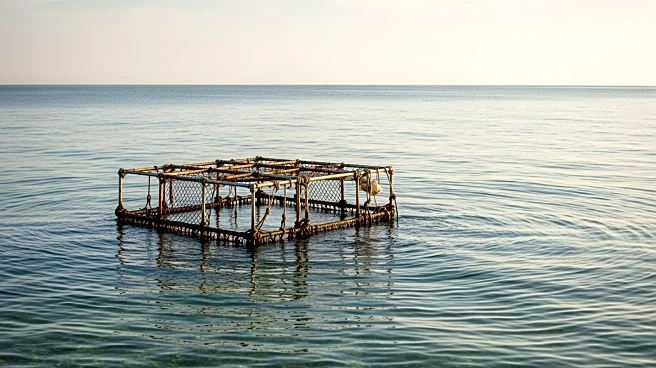What's Happening?
Icelandic musician Björk Guðmundsdóttir, through her non-profit organization AEGIS, has initiated legal proceedings against the Icelandic state regarding sea cage farming operations at Sandeyri in Ísafjarðardjúp.
The lawsuit, filed on her 60th birthday, seeks to annul the Westfjords coastal zone plan introduced in 2022 and demands compensation for a local landowner. The landowner has challenged the establishment of sea pens on his property, claiming they were installed without his consent. AEGIS supports the landowner's assertion that the sea pens were placed within his land's boundaries despite his objections. The organization is advocating for the state's legal responsibility to be acknowledged and for compensation to be awarded.
Why It's Important?
The lawsuit underscores the ongoing debate over environmental impacts of industrial salmon farming in Iceland. Björk's involvement highlights the intersection of celebrity activism and environmental advocacy, drawing attention to the ecological consequences of open net fish farming. The legal action could influence public policy and regulatory frameworks concerning aquaculture in Iceland, potentially leading to stricter environmental protections. The case also raises questions about property rights and governmental accountability in land use decisions, which could have broader implications for similar disputes in other regions.
What's Next?
The legal proceedings will likely prompt discussions among policymakers, environmental groups, and the aquaculture industry regarding sustainable practices and regulatory oversight. If the lawsuit succeeds, it could set a precedent for future legal challenges against industrial farming operations, encouraging more stringent environmental regulations. Stakeholders in the aquaculture sector may need to reassess their practices to align with evolving legal and environmental standards. The outcome of the case could also influence public opinion and consumer behavior towards farmed salmon products.
Beyond the Headlines
Beyond the immediate legal and environmental implications, the lawsuit reflects broader cultural and ethical considerations surrounding food production and animal welfare. Björk's activism through AEGIS highlights the role of artists in advocating for social and environmental change, potentially inspiring other public figures to engage in similar causes. The case may also contribute to a growing global discourse on sustainable food systems and the ethical treatment of animals in industrial farming, influencing cultural attitudes towards consumption and production practices.











